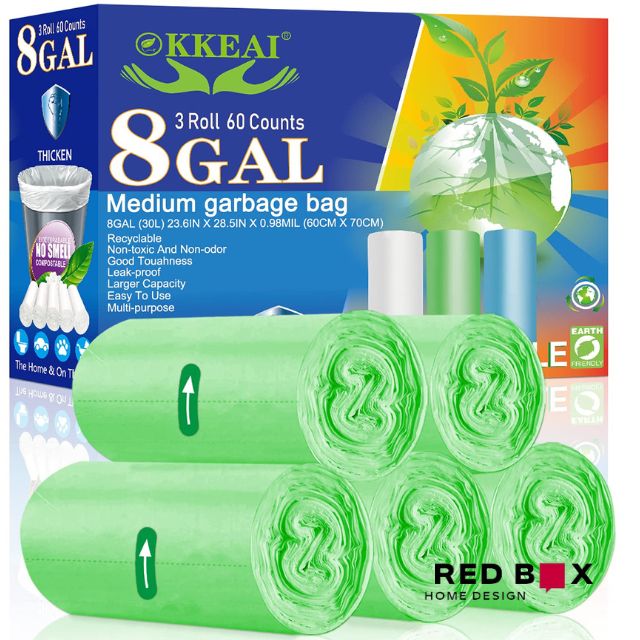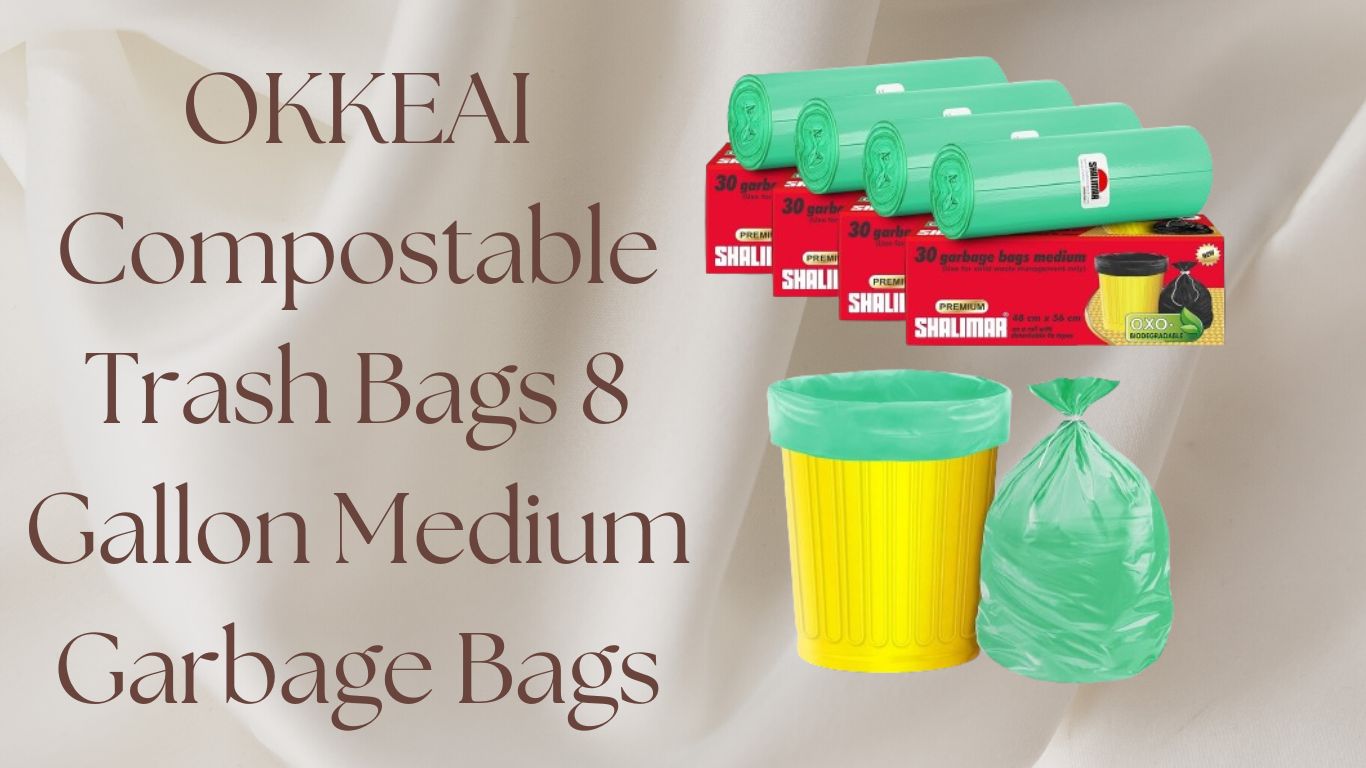Table of Contents
Introduction
Did you know that the plastic trash bags you use daily could be causing harm to our environment? Plastic waste has become a significant global concern, and traditional plastic trash bags play a substantial part in contributing to this problem. However, there is a better alternative available – compostable trash bags. In this article, we will explore the hidden dangers of plastic trash bags and why switching to compostable alternatives is a crucial step towards a more sustainable future.

The Environmental Impact of Plastic Trash Bags
Plastic trash bags are a common sight in households across the United States, but few realize the severe impact they have on the environment. Here are some key reasons why plastic trash bags pose a danger:
1. Non-Biodegradable Nature
Plastic trash bags, made from petroleum-based plastics such as polyethylene, are non-biodegradable. This means they cannot break down naturally over time. As a result, they persist in our environment for hundreds of years, filling up landfills and polluting our oceans.
2. Harmful Effects on Wildlife
Once plastic trash bags end up in the ocean or other ecosystems, they become a significant hazard for wildlife. Marine animals can mistake plastic bags for food and consume them, leading to fatal consequences. Additionally, animals can become entangled in plastic waste, causing injuries and impeding their natural behaviors.
3. Microplastics Contamination
Plastic trash bags eventually break down into smaller microplastic particles that contaminate soil, water, and air. These microplastics not only harm ecosystems but also pose a potential threat to human health. They can enter the food chain through consumption by marine life and eventually reach our dinner plates.
The Benefits of Compostable Trash Bags
Now that we understand the negative impacts of plastic trash bags, it’s time to explore the benefits of switching to compostable alternatives. Compostable trash bags offer several advantages over their plastic counterparts:
1. Biodegradability and Compostability
Compostable trash bags are designed to break down naturally and quickly, thanks to the use of organic materials like plant starches and vegetable-based plastics. When discarded properly in composting facilities or home compost piles, these bags degrade within a matter of months, reducing their environmental footprint significantly.
2. Reduced Dependency on Fossil Fuels
By choosing compostable trash bags, you contribute to reducing our reliance on fossil fuels. Traditional plastic bags are derived from petroleum, a non-renewable resource, whereas compostable bags are often made from renewable resources such as corn, sugarcane, or potato starch. This eco-friendly choice helps in conserving natural resources and lowering greenhouse gas emissions.
3. Lesser Impact on Wildlife and Ecosystems
Compostable bags pose a much lower risk to wildlife and ecosystems compared to plastic bags. These bags naturally break down into organic matter, which enriches the soil instead of causing harm. Switching to compostable bags helps protect our oceans, wildlife, and delicate ecosystems for generations to come.

Making the Switch – Practical Steps
Transitioning from plastic to compostable trash bags might seem daunting at first, but with a little guidance, it becomes an easy and impactful move. Here are some practical steps for making the switch:
1. Research and Choose Reliable Brands
Start by researching and identifying trustworthy brands that offer compostable trash bags. Look for certifications such as the Biodegradable Products Institute (BPI) or other recognized eco-labels, ensuring the bags meet industry standards for compostability. Reading reviews and seeking recommendations can also help you select the right brand for your needs.
2. Check Compatibility with Composting Facilities
If you have access to a composting facility, verify whether they accept compostable bags. Some facilities have specific guidelines for what types of bags they can process. Understanding these specifications will ensure that the bags you choose align with the composting facility’s requirements.
3. Home Composting Options
For individuals with home compost piles, compostable trash bags can be a convenient and sustainable option. These bags can break down naturally alongside your food scraps, yard waste, and other compostable materials. Just make sure to follow proper composting guidelines to create nutrient-rich compost without any plastic contamination.
Taking Action for a Greener Future
Switching to compostable trash bags is a small change with a significant positive impact. Here are a few additional measures you can take to contribute to a greener future:
- Reduce Single-Use Plastic: Minimize your overall use of single-use plastics, such as plastic water bottles, straws, and utensils. Opt for reusable alternatives whenever possible.
- Recycle Properly: Ensure you are recycling all recyclable materials correctly. Familiarize yourself with local recycling guidelines to maximize recycling efforts and reduce contamination.
- Advocate for Change: Spread awareness about the dangers of plastic waste and encourage others to make sustainable choices. Engage in discussions, support local environmental initiatives, and urge businesses and policymakers to take action.
Pros
- Compostable trash bags are made from biodegradable materials, reducing the environmental impact compared to traditional plastic bags.
- They break down into natural components, contributing less to pollution and landfill waste.
- By using compostable bags, you decrease your reliance on traditional plastic bags, helping to mitigate the issues associated with plastic pollution.
- Supporting the shift to compostable alternatives contributes to the reduction of plastic production and consumption.
- Choosing compostable bags aligns with a more sustainable lifestyle, promoting responsible waste management practices.
- Many compostable bags are made from renewable resources, reducing the reliance on finite fossil fuels.
- compostable bags can be disposed of in composting systems, contributing to the creation of nutrient-rich soil.
Cons
- Compostable bags can be more expensive than traditional plastic bags, which may deter some consumers from making the switch.
- Compostable bags might not be as widely available as traditional plastic bags, making it challenging for some consumers to access them easily.
- Consumers may need to adjust their usage habits to accommodate the differences in strength and durability.
Conclusion
Plastic trash bags are a hidden danger that poses a significant threat to our environment. By choosing compostable alternatives, we can make a positive impact and reduce the harmful effects of plastic waste. The benefits of compostable trash bags, including biodegradability, reduced dependency on fossil fuels, and lesser impact on wildlife, make them a sustainable choice. So, let’s make a conscious decision to switch to compostable trash bags and take steps towards a greener, cleaner future.
Why Should Switch to Compostable Trash Bags

OKKEAI Compostable Trash Bags
- Medium Trash Cans Size (L*W) 23.5′ inches * 28inches(60±1×70±1cm); 60 counts of 3 rolls . Fit medium size trash bins Fit 30 Liter, 6,7,8,9,10Gal trash bags.With The Bottom Octagonal Design leave no space to leak.
- MEDIUM GARBAGE BAGS Garbage bags are made of materials that are degradable (using corn starch and other plant renewable resources). They have no odor, odor control and are more environmentally friendly.
- STRONG THICKR GARBAGE BAGS These 7-10 gallon garbage bags have good toughness, a thicker 1.15 mil design and are not easy to tear. Tear resistant, leak proof, perforated, compact and friendly. They have been tested to withstand a maximum weight of 8gal (30 L), this material can make garbage bags stronger than other ordinary trash cans. So you will find that our waste paper liner is not fragile, leakproof, super strong and more durable.
- MUTI-PURPOSE WASTE BAGS Garbage Bags is not only suitable for indoor use (office, kitchen, living room, bedroom, bathroom, diaper treatment, shredder, etc.), but also for outdoor applications (cat litter, dog dung, car waste, etc.) . They are roll-shaped and are very easy to store or carry around.
You May also like Glass Cleaners blog

Regards for helping out, superb info. “Those who restrain desire, do so because theirs is weak enough to be restrained.” by William Blake.